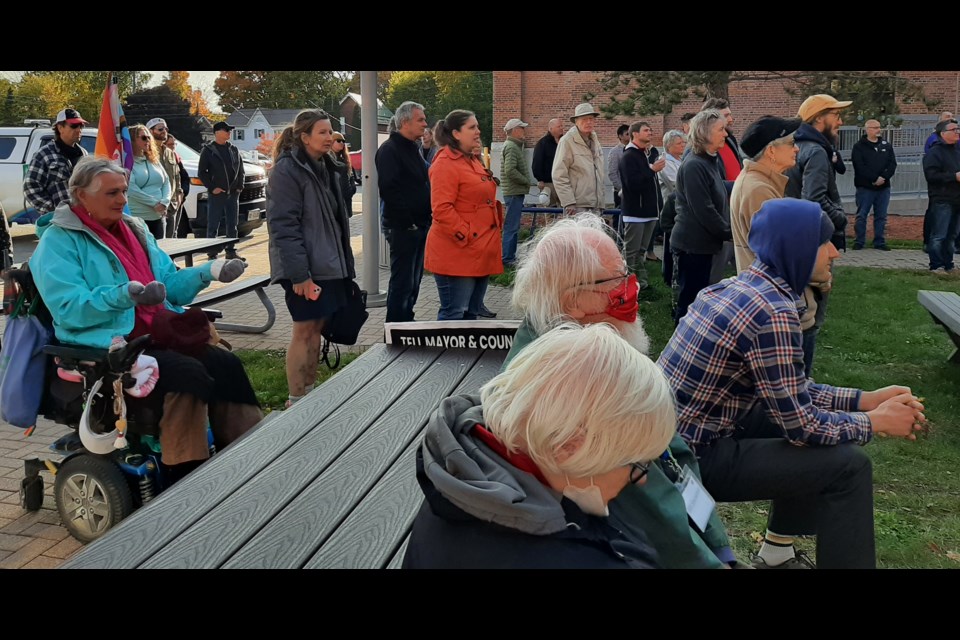Local voters are being urged to be "brave" when they cast their ballots in the upcoming municipal election.
Now is the time to “be brave, have the courage to make the tough, principled decisions, and try a new way," Mark Bisset told about 100 concerned citizens, politicians and municipal election candidates who gathered at Orillia's City Centre Friday for the Get Out the Vote to Stop Sprawl Rally.
Bisset, executive director of the Couchiching Conservancy, spoke about the importance of protecting even one acre of land, or wetland, and how much he has learned about that, and species at risk, while being with the local agency.
He emphasized that sprawl “is the ultimate example of business as usual. The only leaders in a position to say no to that current provincial directive are our municipal politicians.”
Bisset was one of several speakers at the event organized by Madeleine Fournier of Green Orillia and Stop Sprawl Orillia.
Other speakers included Paige Jakobczak, fundraising coordinator at Couchiching Jubilee House; Jacob Kearey-Moreland, local farmer and activist; Claire Malcolmson, executive director of the Rescue Lake Simcoe Coalition; Bob Bowles, master naturalist; and Margaret Prophet, executive director of the Simcoe County Greenbelt Coalition.
Each of the speakers talked about the importance of getting out and voting, as well as the importance of educating political leaders about important issues like the "unsustainability of sprawl."
Fournier emphasized that sprawl is neither sustainable nor affordable, and encouraged attendees and those watching live on social media to go to the Green Orillia website and check municipal candidates’ answers to the questionnaire which focused on more than 30 important issues; it was compiled by Green Orillia and submitted by a number of concerned groups and organizations in the area.
She noted that candidates and elected officials in Orillia and Severn Township were in attendance, and encouraged audience members to talk to them after the event. She said their voices are being heard.
"City council was faced with the choice of either staying the course of boundary extension or having the city’s land needs assessment updated and revised, to consider a higher minimum intensification target and a higher minimum designated green field target. Council voted unanimously for option two, which was a huge win for Stop Sprawl Orillia," Fournier said to rousing applause.
Jakobczak emphasized housing during her time at the podium, stressing the affordable housing crisis is impacting everyone.
She listed clear directives towards solving this crisis, including increasing subsidized units, rent-geared-to-income units, transitional and supportive housing programs, tiny homes, mixed market rental units, hiring an affordable housing coordinator, committing to infill as a strategy to accommodate growth, and revising the city’s 12-year old affordable housing plan to reflect the current landscape.
“There is a misconception that housing affordability and environmental protection are special interests or that they are partisan and are not intricately connected," Jakobczak explained.
"A community that is walkable, affordable, connected to transit, not located in a food desert, and built on pre-existing city land, is not partisan. Investing in people while protecting the environment around us is a sensible act," she said.
Jakobczak also exhorted political leaders to lead.
“Be bold when addressing the housing crisis,” she said. “Be brave. Investing in people and investing in the environment in which we live is always going to show the greatest return on investment.”
Kearey-Moreland took a more informal approach, leading a question-and-answer session with the attendees, around the topic of food.
With the help of audience members shouting out answers, it quickly became clear that food scarcity impacts people in a myriad of ways, including their mental and physical health, children’s learning outcomes. In short, as one audience member said, “nothing good.”
Kearey-Moreland emphasized that food comes from farms, gardens, lakes, forests, oceans, rivers, and wetlands, and all these areas are affected by sprawl.
He had a simple solution: “The city is making this plan, right, and they need to annex land for employment lands. Maybe we could think of the farmland around the city as employment lands? What about that? What if people who are looking for meaningful employment were employed, growing food for our community?’ he suggested to applause.
Bowles, Malcolmson, and Prophet each emphasized the impact of sprawl on delicate ecosystems, wetlands, and lake watersheds, and how these places are some of the most important ways to fight climate change.
“The good news,” said Malcolmson, “is that we have 60% natural cover around Lake Simcoe now, and we only need 40%. The bad news is we have to protect it really well. Sprawl will not do that.”
Fournier urged everyone to pick up a “vote buddy” and make sure neighbours and friends get out and vote.
Reached after the event, she was jubilant about the turnout and its potential impact
“We are so happy with the turnout to today’s event and the local speakers," said Fournier. "Everything went so well. Stop Sprawl Orillia is really a coalition of many groups and individuals, a real team effort. The impact extends well beyond today, with live-streaming and media impact. Hopefully everyone can get out there and vote on Oct. 24.”
